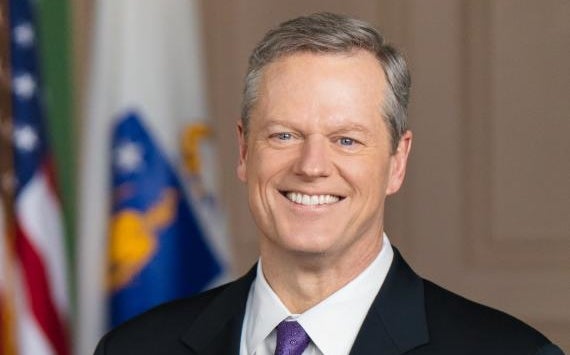Months of uncertainty about the fate of a multibillion-dollar spending package came to an end Thursday when Gov. Charlie Baker signed into law a $3.76 billion compromise bill that, to his disappointment, does not feature the tax relief Democrats once promised.
Baker used his veto pen to strike only $1.1 million from the bill’s bottom line and sent back two proposed changes dealing with certified nurses’ aide exams and retirement buybacks. He also vetoed two dozen outside sections, most dealing with in-state tuition retention language Baker said would be more appropriate in an annual budget or “considered as part of a comprehensive public higher education finance reform effort, not made piecemeal.”
Baker also struck down a section of the bill that would have created a special commission to examine “the potential negative environmental and economic impacts” of discharging radioactive spent fuel pool water, which lawmakers included as Holtec weighs dumping contaminated water into Cape Cod Bay in the process of decommissioning the former Pilgrim Nuclear Power Plant.
The governor said that proposed panel’s work “would be duplicative of, and would interfere with, ongoing work on waste disposal and decommissioning issues by the responsible federal and state agencies.”
The most significant change Baker made is more or less an accounting one. He vetoed language setting a $510 million cap on the amount of federal American Rescue Plan Act funds that could be spent toward the bill’s goals, a move that the administration said would allow Massachusetts to prioritize committing its full pot of $2.3 billion in remaining ARPA money.
That veto does not change the legislation’s bottom line, but it will effectively shift around spending sources so that Gov.-elect Maura Healey and the Legislature will need to decide the fate of carried-forward surplus fiscal 2022 state tax revenues rather than untapped federal aid.
In his signing letter, Baker said he was “deeply concerned” that the proposed cap would have left that much ARPA money unused ahead of an end-of-2024 deadline to commit the full pot and an end-of-2026 deadline to spend it.
“It is imperative that the Commonwealth does not put these funds at risk through further delay in allocating them. Therefore, I am vetoing section 264, which would restrict ARPA-FRF spending to only $510 million,” Baker wrote. “This will allow the Commonwealth to allocate federal dollars first for uses as authorized in line items in this bill. Relative to the enacted bill, the same amount of money will remain unallocated, and that money will still be subject to appropriation, but it will be state money, and it will not expire.”
The bill will steer funding to a range of industries and toward numerous public programs. It includes $850 million in relief for financially strained hospitals, human services providers, nursing facilities, rest homes and community health centers as well as $200 million for the state’s ongoing COVID-19 response.
Other spending highlights include hundreds of millions of dollars for housing production and homeownership supports, $150 million for early education and care providers, $150 million for clean energy initiatives and $100 million for port infrastructure improvements.
The new law additionally provides the MBTA with another $112 million for critical work and safety improvements in the wake of a blistering Federal Transit Administration investigation, which found myriad problems and incurred mandatory corrective action plans. That money adds to $666 million lawmakers and Baker already approved for the T to address those issues.
“The significant investments in this bill will fortify health and human services, advance clean energy and resiliency efforts, expand affordable housing production, and support Massachusetts communities, businesses, and families,” Baker wrote.
Legislative leaders spent months weighing spending ideas and tax relief measures behind closed doors before both branches in July unanimously approved versions of the bill. Those drafts each included $500 million in one-time rebates for middle-income Bay Staters and authorized about half a billion dollars annually in permanent estate tax reforms and tax breaks for renters, seniors, caregivers and others.
Top Democrats tossed their original plan back onto the shelf, however, when they learned in late July that Massachusetts owed taxpayers nearly $3 billion in relief under a 1986 voter-approved tax cap law. The compromise they revived after months of inaction featured none of the previously approved tax reforms as legislative leaders warned about an uncertain economic future.
“As I have also previously expressed, I was disappointed that permanent tax relief reforms were not included in this bill. The measures that I proposed in January and that were supported by the Legislature in earlier versions of this bill are affordable and sorely needed by Massachusetts taxpayers,” Baker wrote in his signing letter. “Recognizing the importance of childcare investments, I am approving sections in this bill that redirect $315 million from the Commonwealth Taxpayer Relief Fund to the High-Quality Early Education & Care Affordability Fund. However, we can invest in childcare and make sensible tax changes at the same time. With the state in a historically strong fiscal position, the tax cuts that the Legislature has committed to prioritizing next session will be affordable without a special set-aside.”
In addition to authorizing spending for economic development goals, the bill includes measures that will allow Comptroller William McNamara to close the state’s financial books on the fiscal year that ended June 30.
McNamara under state law faces an Oct. 31 deadline to file an annual financial report, but delayed action on the closeout budget pushed his work past that date.

